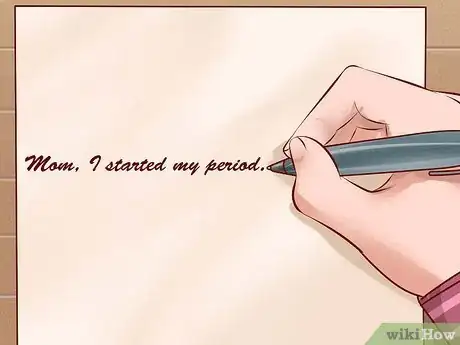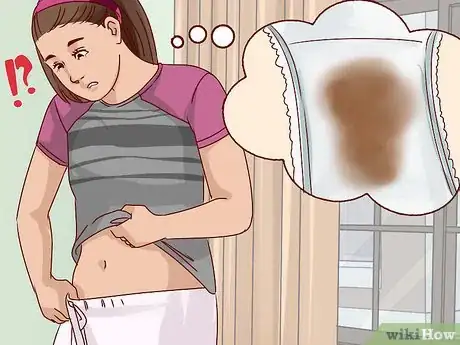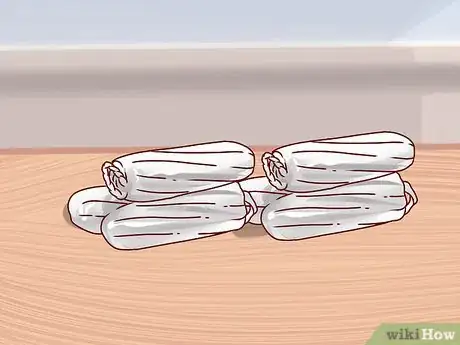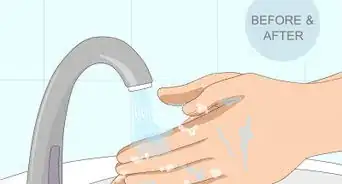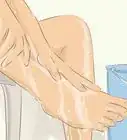This article was co-authored by Rebecca Levy-Gantt, MPT, DO. Dr. Rebecca Levy-Gantt is a board certified Obstetrician and Gynecologist running a private practice based in Napa, California. Dr. Levy-Gantt specializes in menopause, peri-menopause and hormonal management, including bio-Identical and compounded hormone treatments and alternative treatments. She is also a Nationally Certified Menopause Practitioner and is on the national listing of physicians who specialize in menopausal management. She received a Masters of Physical Therapy from Boston University and a Doctor of Osteopathic Medicine (DO) from the New York College of Osteopathic Medicine.
There are 11 references cited in this article, which can be found at the bottom of the page.
wikiHow marks an article as reader-approved once it receives enough positive feedback. This article received 22 testimonials and 85% of readers who voted found it helpful, earning it our reader-approved status.
This article has been viewed 170,944 times.
Your period (known as menstruation) is the shedding of the uterine lining which results in bleeding from the vagina.[1] While it can be an uncomfortable topic of discussion, it is a perfectly natural process experienced by all females of reproductive age. It's important to know how to approach the subject without feeling ashamed or embarrassed.
Steps
Talking to Your Mom
-
1Start a conversation with your mom. Approach your mother and simply state, "I started my period." This will open the door to an honest conversation. Reactions will vary from mother to mother, and include happy, excited, or flat. Regardless, your mom will never be angry or disappointed. Once the subject has been broached, your mom will likely take over the conversation and help you with all you need to know.
- Choose an appropriate time. If it needs to be done immediately, feel free to do so. Otherwise, choose a time that allows for a lengthy conversation.
- Sometimes it helps to write out a script ahead of time so you can approach the subject with confidence.
- The hardest part is gathering the bravery to get started. Just remember that you'll feel less stress when the conversation is over.[2]
-
2Connect to her as a female. Remember, your mom has gone through this too.[3] In fact, she may still be getting her period monthly. The important thing to keep in mind is that she understands, and she is there to help.
- Your mom has the "hands-on" experience to answer any questions you may have.
- More than likely, your mom will be prepared with pads or tampons and will be more than happy to explain their differences and demonstrate the proper use.
-
3Write a note. Write a simple note stating something like "Mom, I started my period" or "Can you buy me some tampons/pads?" Place the note in a place where only she will find it, such as in her purse, her makeup kit, or her underwear drawer.
- Make sure the note is short and to the point so that there is no confusion.
- Be prepared for the response. Once you let your mom know about your period, she'll want to have a face-to-face discussion regarding it.
-
4Show her your underwear. Change your underwear but don't wash them. Instead, call your mom to your room and show her the underwear. Having had a period before, she'll immediately recognize it and initiate the conversation about what happens next.
- You should be looking for discharge that is slightly pink, brown, or red.
- Don't be embarrassed to show your mom your underwear. She won't be grossed out--she's been there before.
- Blood will stain your underwear so immediately wash or soak your underwear to avoid staining.
-
5Wait a while to be sure. If you only have brown discharge, then wait for your period. By the time your period comes, you may already have a plan for how to tell your parents. It's also possible that it was a false alarm and your body is just preparing itself for your period.
- Brown discharge before a period is normal. This could be a layer of nutrients being discharged before the actual menstruation.[4]
-
6Relax. Again, feeling nervous is a perfectly normal feeling. Just imagine how nervous your mom must have been when she had the conversation with her mom years ago. Try deep breathing and positive thoughts to help you cope with your nerves.[5]
- Breathe in slowly through your nose and out through your mouth. Focus on taking 30 slow, deep, breaths and you should feel more relaxed afterwards.[6]
- Ask yourself, "What's the worst that can happen?" Remind yourself that many people have gone through this and survived. Gaining this perspective can help you to relax.[7]
-
7Talk to someone you can trust. In some situations, parents aren't as supportive or understanding as one would hope. If this is the case, try talking to someone with which you feel comfortable. For example, a school nurse, a teacher, or a friend's parent.
Talking to Your Dad
-
1Don't be embarrassed. Remember, menstruation happens to lots of people; in fact, it even happens to some female animals. The important thing to remember is that the apprehension you are feeling will lessen over time.[8]
- Know that your dad is mature enough to handle "the period talk." As an adult male, your dad not only knows what a period is, but has probably been expecting to have this talk with you for some time.
- Your dad may be slightly embarrassed as well. Take comfort in knowing that you're not the only one trying to get a handle on your emotions.
- Understand that your reaction is a normal one. Starting your period can be both confusing and emotional.
-
2Keep it simple. Sometimes the easiest way to approach the situation is to just say, "Dad, I got my period." Keeping it brief and to the point will help you to avoid becoming emotional. Instead of building up to a big sit down conversation, try approaching the subject during down time such as when watching television or eating dinner.
- By being direct, you avoid confusion and open the lines of communication between you and your dad.
- Your openness may ease his discomfort and he may become a valuable resource for information.
-
3Try a pre-made note online. Sometimes it's easier to write words than to speak them. But what happens if you can't find the right words to say or write? There are scripted notes online that can be addressed to anyone and that allow you to ease into the topic. With titles like "guess what" or "we need to talk" it sends a clear message to dad without the awkward talk.
- The great thing about this option is that it informs your parent, but puts the responsibility of initiating the conversation on them.
- Be sure to put the note in a place where your dad is sure to find it, and make sure he'll find it at an appropriate time. Giving the note to him when he's running out of the house for work isn't the best option.
-
4Ask to talk to a female you both trust. Sometimes it's just easier to talk to a female about female problems. If you don't have a mother or older sister around, tell your dad that you need to speak to a female about "female issues" you are experiencing.
- Your dad may become curious or worried at this point. You can ease his curiosity by simply stating "I started my period and I would rather talk to a woman about it."
- You can make your dad feel like part of the process by asking for his advice about who to go to for help.
-
5Ask him to schedule a doctor's appointment for you. As someone who is in charge of your healthcare, your dad will probably ask why you need to visit the doctor. At this point you can inform him that you are having a personal issue. This will either open the door to further communication or give your dad a clue that something is going on.
- Your doctor is not only a great source of information, but they can also assist you in telling your dad about your period.
- A close alternative is the school nurse.
- You can always get feminine products from your school nurse while you're figuring out how to tell your dad. But don't hide it from him for too long. It is definitely something for which you don't have to be ashamed.
-
6Talk to someone else. What happens if your dad isn't someone you can trust or if he is embarrassed by the situation? You can always choose to confide in a trusted confidant like a family friend, relative, or a trusted neighbor.[9]
Handling Your Period
-
1Clean yourself. If you started your period unexpectedly, chances are you've made somewhat of a mess. If you are at home, shower and change your underwear. If you are in public and can't get home immediately (for example at school), try cleaning yourself as best as possible with wet wipes and/or toilet paper.
- As you are getting used to your period, it might be a good idea to carry extra supplies (underwear, pads, wet wipes) in your backpack or purse.
-
2Determine your flow. Your flow refers to how light or heavy your blood flow is during your cycle. The number of pads and tampons used per day is in direct correlation to your flow. Over time, you should begin to recognize how light or heavy your flow is in order to be prepared for your cycle.
- Light flow usually occurs at the beginning and end of your period.
- Heavy flow is identified as bleeding which requires you to change your pad or tampon hourly.
- Blood clotting is also common during a heavy flow. This is when you see "blobs" of blood that are darker in color.[10]
- Knowing your flow will help you in purchasing the correct sanitary products.
-
3Use a pad. A sanitary pad is a thin pad that consists of absorbent material. It is placed in the lining of your underwear to absorb the blood flow, and has an adhesive side to keep it in place.[11]
- Pads come in various lengths to account for the direction of blood flow while doing different activities (working out, sleeping, etc.).
- Pads also come in various thicknesses to account for light through heavy flow.
- Pads also come with "wings" to secure the pad in place and to stop accidental leaks.
-
4Opt for a tampon. Tampons are made of cylindrical shaped absorbent material that is inserted into your vagina to absorb blood flow. Most come with an "applicator" that assists in inserting the tampon into the vagina. They come in various forms that allow for different levels of comfort and absorption.[12]
- If you're new to tampons, try a slender fit until you get the hang of it. They're not as effective against heavy flows but they may be more comfortable.
- Applicators come in both plastic and cardboard form. Some have rounded tips and some don't. As a beginner, a plastic applicator with a rounded tip may work best.
- It's best to try using a tampon for the first time when your flow is medium to heavy. This will allow the tampon to slide in more easily, and to be pulled out more easily later.[13]
- Some people prefer to use tampons for activities such as playing sports or swimming.
- You can be a virgin and still use a tampon. Using tampons has nothing to do with being sexually active.
-
5Take care of your hygiene. Once the period blood leaves the body, it is more likely to become contaminated. In addition, when these organisms remain in a warm, damp, place it's more likely to lead to infection or an unpleasant odor.[14] Be sure to pay especially close attention to your hygiene during your cycle by changing your pad/tampon often and showering daily.
- Even if your pad isn't "full," try to avoid going the entire day without changing it. The standard for pads is once every 4-6 hours, and once every 2 hours for tampons.[15]
- Blood can often enter small spaces like the skin around your vagina or legs. Be sure to wash off excessive blood when possible to avoid build up and odor.[16]
- Discard your sanitary products properly. Wrap your pads in the pad wrapper or tissue paper before discarding in the trash. Check your tampon applicator to see if it is flushable or if you should wrap it and discard it in the trash.
Expert Q&A
-
QuestionI think my daughter had her period, but she hasn't talked to me about it. What should I do?
 Rebecca Levy-Gantt, MPT, DODr. Rebecca Levy-Gantt is a board certified Obstetrician and Gynecologist running a private practice based in Napa, California. Dr. Levy-Gantt specializes in menopause, peri-menopause and hormonal management, including bio-Identical and compounded hormone treatments and alternative treatments. She is also a Nationally Certified Menopause Practitioner and is on the national listing of physicians who specialize in menopausal management. She received a Masters of Physical Therapy from Boston University and a Doctor of Osteopathic Medicine (DO) from the New York College of Osteopathic Medicine.
Rebecca Levy-Gantt, MPT, DODr. Rebecca Levy-Gantt is a board certified Obstetrician and Gynecologist running a private practice based in Napa, California. Dr. Levy-Gantt specializes in menopause, peri-menopause and hormonal management, including bio-Identical and compounded hormone treatments and alternative treatments. She is also a Nationally Certified Menopause Practitioner and is on the national listing of physicians who specialize in menopausal management. She received a Masters of Physical Therapy from Boston University and a Doctor of Osteopathic Medicine (DO) from the New York College of Osteopathic Medicine.
Board Certified Obstetrician & Gynecologist It's your job as the parent to broach the conversation and make your daughter feel comfortable about her body. It's pretty scary as a young girl to go through this for the first time, so bringing it up first is the best way to get her to open up. I should note, I'm not necessarily talking about some big family meeting where you have a huge conversation about it. It's more so about normalizing it. Make it a normal thing, because that's what it is. This is the best way to get your daughter to open up.
It's your job as the parent to broach the conversation and make your daughter feel comfortable about her body. It's pretty scary as a young girl to go through this for the first time, so bringing it up first is the best way to get her to open up. I should note, I'm not necessarily talking about some big family meeting where you have a huge conversation about it. It's more so about normalizing it. Make it a normal thing, because that's what it is. This is the best way to get your daughter to open up.
Things You'll Need
- New underwear
- Pads or tampons
References
- ↑ http://www.medicalnewstoday.com/articles/154699.php
- ↑ http://kidshealth.org/en/kids/talk-parents.html
- ↑ https://www.ubykotex.com/en-us/periods/puberty/how-did-you-guys-tell-your-mom-about-your-period
- ↑ http://www.women-info.com/en/brown-discharge-period/
- ↑ Rebecca Levy-Gantt, MPT, DO. Board Certified Obstetrician & Gynecologist. Expert Interview. 3 April 2020.
- ↑ http://www.positivityblog.com/index.php/2007/11/12/how-to-overcome-nervousness/
- ↑ http://www.positivityblog.com/index.php/2007/11/12/how-to-overcome-nervousness/
- ↑ http://kidshealth.org/en/parents/embarrassed-about-period.html
- ↑ http://teens.webmd.com/features/i-cant-talk-to-my-parents?page=2
- ↑ http://www.bepreparedperiod.com/blog/know-your-flow/
- ↑ Rebecca Levy-Gantt, MPT, DO. Board Certified Obstetrician & Gynecologist. Expert Interview. 3 April 2020.
- ↑ Rebecca Levy-Gantt, MPT, DO. Board Certified Obstetrician & Gynecologist. Expert Interview. 3 April 2020.
- ↑ http://youngwomenshealth.org/2012/09/27/tampons/
- ↑ https://www.thehealthsite.com/diseases-conditions/hygiene-during-menstrual-periods-10-things-you-should-know-81218/
- ↑ https://www.thehealthsite.com/diseases-conditions/hygiene-during-menstrual-periods-10-things-you-should-know-81218/
- ↑ https://www.thehealthsite.com/diseases-conditions/hygiene-during-menstrual-periods-10-things-you-should-know-81218/
About This Article
Telling your parents you started your period can be a bit embarrassing, but there’s no need to overthink it. Consider telling your mom first, which might feel more comfortable. Remember that your mom’s been through it herself and she will understand. Say something simple like, “Mom, I just want to let you know, I started my period today.” If you want to tell your dad first, or your mom’s not around, tell him the same thing, which will make it clear and brief. If you can’t bring yourself to tell them in person, text your mom or dad. Write something like, “Mom, I got my period. Can you buy some tampons?” For more tips from our co-author, including how to tell someone else you’ve started your period if you don’t feel comfortable talking to your parents, read on.


